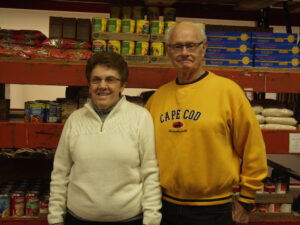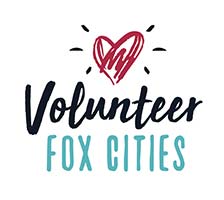By Jeff Zdrale
Donna and Bob Stanek are quite healthy and they intend to stay that way. Their approach to keeping themselves on top of the COVID virus is good and something that can serve as a model for many other RSVP volunteers.

Like many folks in RSVP, this Appleton couple had active and long careers before their volunteering. Donna worked in accounting for the Voith Company for 21 years and followed that up with seven more as a part-time member of the accounting staff at ABLE Manufacturing. Bob spent 38½ years with We Energies ending his career as a company troubleshooter and able to work from home.
After a couple months of “deflation,” Bob decided to continue being active, but this time, as a volunteer. This decision led to him to spending 12 years assisting patients at St. Elizabeth Hospital. From there, Bob went to the Salvation Army, working on the annual Christmas distribution and then began to serve clients at the food pantry (130 E. North St., Appleton), where he has been for the past 3½ years.
Donna followed his lead. When she retired in 2008, she also started to volunteer. Donna started at the front desk of RSVP’s sponsoring agency, Volunteer Fox Cities, in April 2010. In November of that year, she started at the Salvation Army interviewing people regarding their eligibility for the Christmas distribution. Then, in November of 2011, Donna began working for the pantry program.
Donna and Bob have seen a lot of changes over the years, but nothing compares to the modifications the Salvation Army Food Pantry has had to adopt as a result of the COVID-19 crisis. When the shutdowns started, the pantry staff met with all the volunteers and explained the changes to come. Volunteers were given the option of continuing on site or staying home for a while. Some did choose to stay at home out of concern for the health of their families. Bob and Donna didn’t hesitate, however. They both offered to keep working their shifts on site.
Prior to the shutdown, Donna worked in the program’s office on Fridays interviewing and registering new clients. This program permits clients to get groceries for one calendar year before having to renew their memberships. When procedures changed due to the coronavirus, face-to-face interactions were greatly limited. So then, Donna began to work on Mondays and Fridays in the food pantry.
Bob’s duties also have changed. He does not have direct interactions with clients anymore. Working only inside the pantry, Bob sanitizes carts, bags produce, fills carts with dairy and meat products and stocks the shelves.
Donna notes that all the safety sanitization measures that have been recommended are closely followed by the Salvation Army pantry. Clients were previously permitted to use the program once a month, but now they may come weekly. The daily lunches that were served indoors are now offered outside. People can eat these pre-packaged meals on site, but most take them back home or to work. Bob and Donna both agree that use of the pantry has markedly increased during the past two months.
Being careful does not end when this couple ends their shifts. Bob and Donna scrupulously follow their own safety routine at home. Their masks are sprayed, inside and out, with Lysol. Shoes are sprayed and left in the garage. The outer clothes they’ve worn at the pantry—Donna says, “They’ve never seen the Stanek living room.” Their jeans and sweatshirts also get a Lysol spritz before their weekly dunk in the washer.
Perhaps what Bob and Donna have done and are doing is not that out of the ordinary. But this is the point: The Staneks are a model for every RSVP volunteer. They’ve continued providing “ordinary” services to those in need during these extraordinary times.
Editor’s note: Jeff Zdrale is a member of RSVP and the RSVP Community Council.

